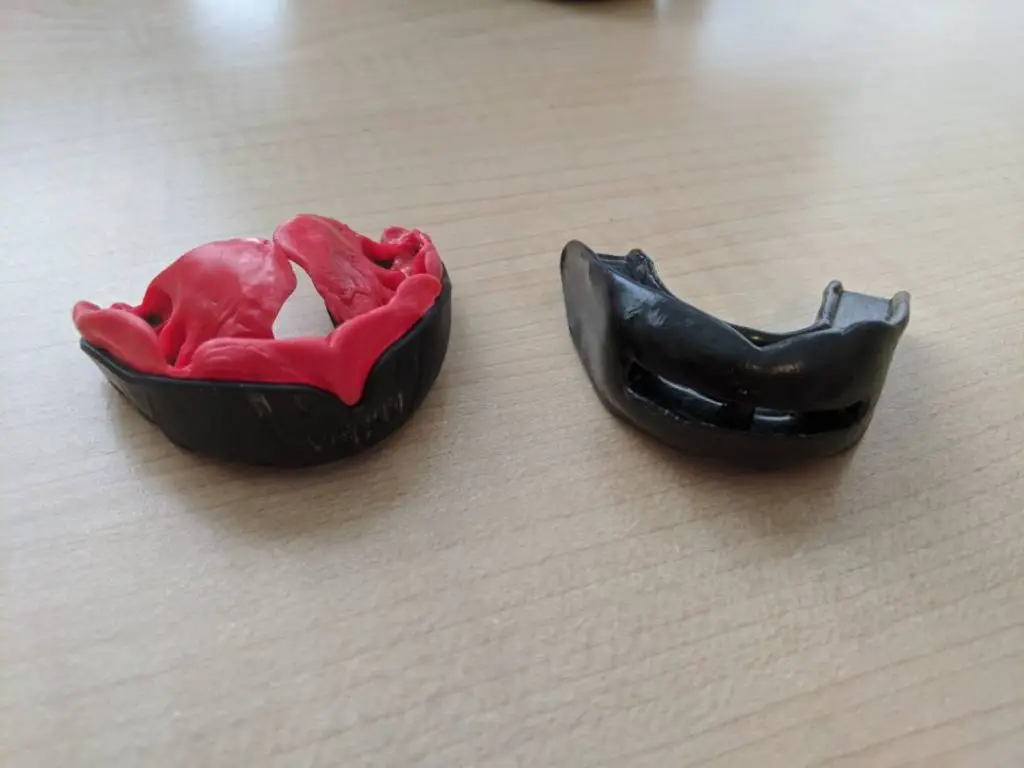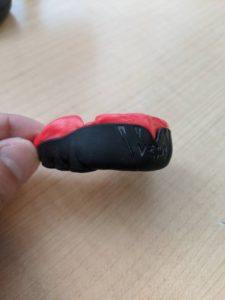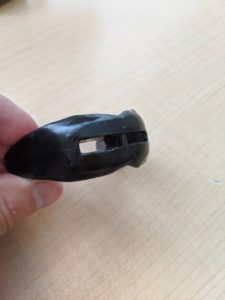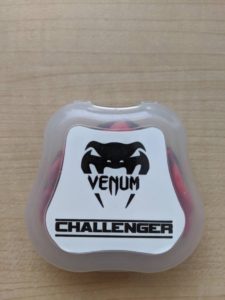
When I started Jiu-Jitsu, MMA, and Muay Thai (yes at the same time) I wasn’t sure what style of mouthguard to get. I like my teeth and wanted to make sure they were protected. When I bought my first one I got a double mouthguard and a month later I bought myself a single mouthguard to see which style fits me best.
This article is going to examine what protective qualities they both offer, the advantages and disadvantages of using the different types of mouthguards, and the difference between an off-the-shelf mold vs a custom mouthguard. Hopefully, the information provided can help you select the correct mouthguard for you!
A single mouthguard is the most popular style of mouthguard for a reason. They offer comparable protection to a double with the added benefits of being compact, easy to breathe/talk in, and drink water with.
A double mouthguard protects both upper and lower teeth, with additional protection to the jaw. The additional protection comes at the cost of being bulkier and requiring the mouth to be shut making it harder to breathe in.
If you’re in need of a new mouthguard feel free to read the review of my favorite mouthguard, the Venum Challenger. Don’t feel like reading and just need a good mouthguard? Purchase it here.
What Does A Mouthguard Do?
A mouthguards’ main purpose is to create an even amount of pressure across the jaw and have a barrier between the upper and lower teeth. This means that if an object hits your mouth, there’s less chance of damaging both sets of teeth.
Mouthguards are proven to work as well, as an ADA study found that 60% of dental injuries caused by combat sports could have been prevented by a mouthguard.
You tend to find mouthguards in such sports as Boxing, Kickboxing, Judo, Jiu-Jitsu, Rugby, and many more. There are two different types of mouthguards that athletes use depending on the sport and purpose. These two types are a single mouthguard and a double mouthguard.
Protective Qualities
As you might have guessed, a double mouthguard offers more protection than a single mouthguard. They are a lot bulkier and cover both the top and bottom row of teeth.
A double mouthguard also helps to keep the soft tissues safer due to the impact being distributed over a bigger area when compared to a single mouthguard. They also have an additional advantage of protecting the jaw joints because the joints won’t move.
Single mouthguards don’t offer the same level of protection for the whole mouth. They offer a good amount of protection to the upper teeth, but the bottom row is very exposed. The soft tissues around the mouth and gums are also exposed and likely to get damaged because the impact isn’t being reduced as much due to the lack of surface area.
If you leave your mouth open whilst sparring using a single mouthguard, there is more of a chance you could lose a tooth than a double mouthguard.
Single Mouthguard
A single mouthguard sits and protects the upper row of your teeth while offering protection to the other tissues in your mouth like the gums and tongue. The single mouthguard is the most popular style of a mouthguard in all sports that require a mouthguard.

| Pros | Cons |
| Easy to breathe in | Less protection than a double mouthguard |
| Drinking water with it in is possible | May wear out quicker than a double mouthguard |
| Compact | Requires a solid mold to remain in place |
Advantages Of A Single Mouthguard
The major advantage of having a single mouthguard is comfort. A single mouthguard is designed to fit perfectly and then allow you to bite down on it, closing the gap and physical barrier from the top row of teeth to the bottom row of teeth. Using a double mouthguard does not allow this because both sets of teeth are separated by a bigger gap which means the physical barrier is bigger.
Another advantage is that the jaw joints aren’t as extended when compared to a double mouthguard. Single mouthguards are often designed to be small and compact which means that the jaw is less likely to get dislocated or broken on impact as the jaw isn’t as stretched. This also means that you can take on more water and fluids too which is ideal for rehydration and recovery.

Single mouthguards tend to be better staying in position after taking smaller impacts. Whilst this can vary on a variety of factors, a single mouthguard tends to sit in position better, you have the use of your bottom teeth, so you can hold it in place quite easily. This also reduces the chances of the mouthguard catching on the gums as well which helps to reduce irritation and damage.
The final positive is that you can also breathe a lot easier when using a single mouthguard. You can still breathe relatively easy as there’s no obstruction to the mouth or airways. This helps to keep your stamina levels high as well as being able to oxygenate blood faster which is important for any sport, especially in combat sports.
Disadvantages Of A Single Mouthguard
The biggest disadvantage of using a single mouthguard is that it doesn’t offer a lot of protection overall. It’s reasonable for protecting the top row of teeth and is good for protecting some soft tissues around the mouth but a lot of vital areas are still exposed such as the bottom teeth.
The main thing to consider in terms of durability is that single mouthguards often aren’t as long-lasting when compared to double guards. Whilst they are normally well made and reliable, they just don’t last as long because the impacts to the same area cause more stress because the energy isn’t being dispersed as much which can cause breaks in the material. This means that you have to replace it more frequently which can be frustrating.
Another thing to consider is that they are quite easy to knock out and displace. As previously discussed, this can vary. The opposite side to this point is that you are reliant on the bottom teeth holding the mouthguard in place as well as correct placement in the mouth. This means that a well-placed punch or fall can knock out the mouthguard. This is quite a common occurrence in combat sports, especially boxing and Mixed Martial Arts.
Double Mouthguard
A double mouthguard requires to have your mouth closed at all times to keep the mouthguard in place. It protects both the top and bottom teeth and forces you to keep your jaw closed at all times.

| Pros | Cons |
| More protection | Less comfortable |
| Helps protect the jaw joints | Bulkier |
| Forces the mouth to be closed | Harder to breathe in |
Advantages Of A Double Mouthguard
The obvious advantage of a double mouthguard is that there is more protection. Both your top row and bottom row of teeth are always protected. Also, your gums and soft tissues in your mouth are protected because the energy from the impact has more surface area to dissipate.
A slightly different advantage is that a double mouthguard does also protects the jaw joints quite well, just in a different way. Even though your jaw is stretched a little more, they are locked in place which means that the chances of dislocating or breaking your jaw are greatly reduced.
Another advantage is that a double mouthguard allows makes you close your mouth completely. The advantage of this is that you are forced to breathe through your nose.

Breathing through your nose in combat sports is considered to be a much better technique than breathing through your mouth. This is because your teeth aren’t exposed, so a stray punch or awkward landing from a takedown won’t damage your teeth because you had your mouth open.
One advantage you might not have thought about is that double mouthguards are fantastic if you have braces due to the extra size they possess. It’s ideal for protecting the brace and can be worked around surprisingly easily by dentists. Make sure to check with your dentist and ask questions about the materials the mouthguard should be made out of and how they should fit with braces on!
Disadvantages Of A Double Mouthguard
A big disadvantage of using a double mouthguard is that they are uncomfortable. They are big, bulky, and stretch the jaw more than what a single mouthguard would do which can feel uncomfortable, especially when you are in a combat situation. A lot of comforts also comes from your teeth structure.
If you have perfect teeth, it’s a little easier to wear a double mouthguard. However, if you have any abnormality, the experience can be quite uncomfortable. Double mouthguards do tend to catch on sensitive areas too such as the gums which can cause further irritation.
It’s also harder to breathe and drink water with a double mouthguard. Obviously, there is less area in your mouth when you have two guards in it. This greatly reduces the ability to take in oxygen and rehydrate properly which means that your stamina levels drop quite dramatically.
You can buy double mouthguards that have holes in them to help with this issue but even these solutions don’t work as effectively as a single mouthguard.
Off The Shelf Or Custom. Which Is Better?
No matter what mouthguard you decide to go for, single or double, it’s recommended you always get a good quality custom-mold guard made. This is because they offer far superior fit and comfort as they are molded to your teeth using high-quality materials whereas off the shelf mouthguards will not do this.
They come in a variety of shapes and sizes as well which is important to know. They tend to be prescribed by dentists too which means that the build quality is also fantastic. They will be more expensive but it’s certainly worth the extra cost.
There are a few advantages to buying an off the shelf mouthguard though. They can easily be bought by the majority of sports shops or pharmacists. The boil and bite method of shaping is also effective as the teeth will mold to the pattern relatively effectively. They are also quick to fit as well.

However, the major detraction is that they don’t last long generally, won’t withstand the impact of any combat sport, are very easy to knock out if they are not fitted correctly. For these reasons, they aren’t worth purchasing as you might as well get a quality custom made mouthguard.
Any combat sports, no matter what level and how much contact is involved, need to have a high-quality custom mouthguard to prevent injury and off the shelf, mouthguards don’t provide this to the same extent that custom made ones do.
If you are struggling to find a mouthguard or you’re waiting for a custom one, then using an off the shelf mouthguard will offer some protection. If you plan on doing any sport that requires a mouthguard for a while it’ll be worth investing in a custom-molded mouthguard.
Conclusion
The best way to choose a mouthguard is to weigh the pros and cons for both and ultimately try both to see which one fits your preference best. Whichever mouthguard you choose it is important to mold it properly to your teeth. Whether single or double, a poorly molded mouthguard will not give you the proper protection.
Ensure your mouthguard is secure. If you have a single mouthguard that falls out when you open your mouth, it is not molded correctly. If you have a double mouth guard that wiggles and moves around, then it is not molded correctly.
Off-the-shelf mouthguards are sufficient; however, if you are serious about your sport it will be worth saving for a custom-molded one as they offer superior protection, perfect fit, and better durability.
A single mouthguard will allow you to open your mouth during your sport meaning you can breathe, drink, and talk easier. It offers sufficient protection and is the primary choice for most athletes, from MMA to basketball. A double mouthguard offers more protection both in the mouth and jaw but will require you to breathe through your nose or through the little slits in the mouthguard while adding additional bulk in your mouth.
